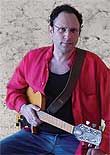
|
|
|
|
© 1972–2019 BHG LLC
A Brief Biography of Bill Weinman

NOTE: This was written around 1998. It has been updated a little, but not much. It's fairly accurate, and mostly old.
Bill Weinman has been involved with technology all of his life. He built his first computer in 1973 with an Intel 4004 (the original microprocessor), a solderless breadboard and a kilobyte of core memory that he wound himself. Since then he has worked as a musician, technologist, programmer, and author.
Author of books, articles, and online courses on the technical aspects of the Internet and the World Wide Web, Mr. Weinman has built a reputation for his ability to grasp complex technical topics and explain them in clear, concise terms.
In the late 1960s and early 1970s Bill earned his living as a performing musician, traveling with several rock-n-roll bands (that you have never heard of) and playing piano for silent movies at specialty theaters in L.A.
Throughout the 1970s and '80s Mr. Weinman designed computer hardware and software as an independent contractor for a number of large and small organizations. Some of the more well-known of his clients include, IBM, NASA, BankAmerica, Bank of New Zealand, Hoare-Govette (London), the State of California, and KWHY-TV (channel 22, Los Angeles).
In his computer/electronics consultant mode, Mr. Weinman has designed a fiber-optic transceiver for NASA's Voyager II space probe (still operating, now outside the orbit of Pluto), currency and commodities trading software for BofA and several other banks, a speech synthesizer for Stevie Wonder, a broadcast ticker-tape system for The Business Channel, (KWHY-TV 22, Los Angeles), a set of drivers for IBM's windows-based products, and a variety of network drivers, applications, and other code for companies large and small.
Since about 1981, Mr. Weinman has run an on-line service in one form or another almost continuously. He was the founder of the B·C·S BBS in Los Angeles, which he ran until the mid-1990s. More recently he co-founded WebMonster Networks, a hosting company that specializes in email and community-oriented projects. He continues to run online forums for programmers, musicians, and music-enthusiasts.
In recent years Mr. Weinman has designed and built web applications and sites for a variety of clients including MGM, Citibank, Salomon Brothers, Smith Barney, and many others. He has also written a whois client that has become a de facto standard for both command-line and web use.
In the early 2000's Bill designed and built the Web Music Database, an interactive cooperative database and community designed to collect and catalog exhaustive information about recorded music and to provide a forum for people to discuss and interact regarding their music-related interests. While working on this project Bill invented a new type of database engine called the Polymorphic Database (US Patent 7,003,524).
Currently Bill is working on a new paradigm for electronic mail that will discourage abuse of the medium in much the same way that the current paradigm encourages it.
Bill has worked as a composer and performing musician, playing guitar, bass, guitar, piano, guitar, drums, and guitar for various bands and venues accross the U.S. Bill would love to produce a film about the War of the Currents, a dramatic battle between Nikola Tesla and Thomas Edison in the late 1800's and early 1900's.
You can often find Bill composing music in his digital home-studio, jamming in Blues bars, or playing in Backgammon or Poker tournaments, but it may be easier to use his contact page. Or, you can subscribe to Bill's Facebook page, for information about his current projects and other interests.
| And now, some feedback: EEEEEEEEEEEEEEEEEEEEEEEEEEEEEEEEEEE! |